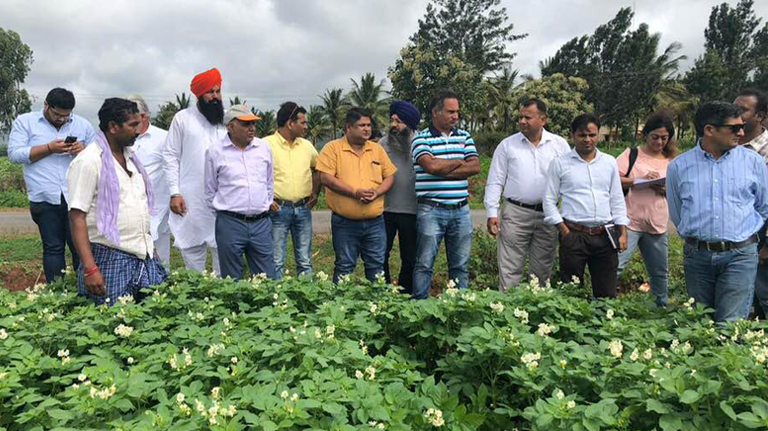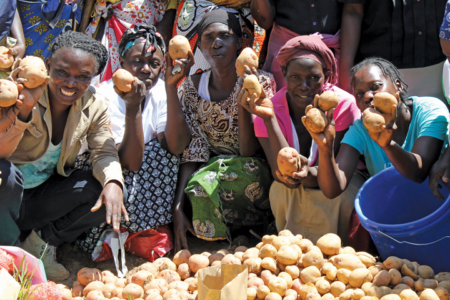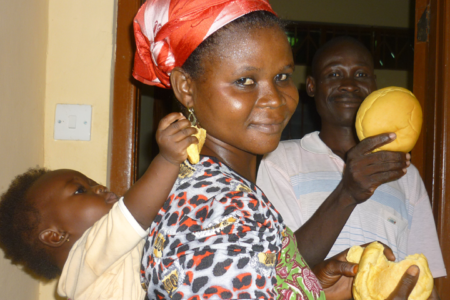
Potato productivity in Karnataka is below the average in India, yet demand is likely to rise. A new center of research excellence will enable the state to benefit fully from potato and sweetpotato intensification.
Background
Despite the significance of potato, its productivity in Karnataka is one of the lowest in India, with farmers yielding only 12 tons per hectare, compared with a national average of 22 tons. The lack of availability of high-quality seed at an affordable price has contributed to the low productivity. Yet demand for potato and sweetpotato in India will increase—as vegetables, but particularly as processed products—with rising incomes and diversifying consumption. The demand for sweetpotato is due in part to its high nutrition content (it is a rich source of dietary fiber, natural sugar, complex carbohydrate, vitamins A and C, calcium, and iron). The use of sweetpotato for chips, sweets and purée is already on the rise in India.
As a major agricultural state in India, with advanced infrastructure and progressive farmers, Karnataka is ideally positioned to take advantage of rising demand. Intensification of potato and sweetpotato, which are less water-intensive crops than rice, will improve the future sustainability of the farming systems in the state. The availability of heat-tolerant potato and sweetpotato varieties grown in the monsoon season is likely to attract chip manufacturing companies and other processing industries to set up facilities in the state, thus potentially providing more employment as well as boosting export opportunities.
For this expansion to take place, a series of improvements is needed along the potato and sweetpotato value chains and the local potato seed production system needs to be revamped with state-of-the-art technology. To overcome technological constraints and strengthen the value chain, the International Potato Center (CIP) is establishing a center of excellence for research and development in potato and sweetpotato, in partnership with the University of Horticultural Sciences, Bagalkot (UHSB). The main research center will be housed within the university’s Bangalore campus, managed by CIP in close collaboration with the university. CIP’s technical expertise will support several state-of-the-art lab and seed-production facilities for the development and dissemination of potato and sweetpotato varieties. These include an in vitro facility, potato and sweetpotato breeding labs and greenhouses, a seed production facility, and a nutrition and processing laboratory.
Objectives
The overarching objective of this project is to provide technological support for the development of the potato and sweetpotato sectors in Karnataka. This will improve farmer incomes, boost food and nutrition security, generate employment in the agriculture sector and improved the livelihoods of poor farmers. Based on strategic partnerships, the center seeks to help:
- incorporate adapted potato and sweetpotato varieties into local farming systems and disseminate in the target area;
- build the capacities of community-based organizations and public–private platforms for the timely supply of affordable quality planting materials;
- improve system productivity through climate-smart sustainable production practices; and
- facilitate the development of sweetpotato and potato value chains and markets
Approach
The project will identify, test and release farmer- and market-preferred, resilient, nutritious, and high-yielding short-duration potato and sweetpotato varieties for table consumption and for processing. These varieties will be suitable for inclusion in different farming systems, and adapted to the agro-ecological conditions of Karnataka. The project will use potato and sweetpotato varieties already released in India, and elite clones from CIP’s breeding program, which combine several desirable traits such as preferred flesh and skin colors, higher yield, earliness and good processing quality.
A suite of better production practices to improve productivity and reduce production costs will be tested and introduced. Mechanization will give farmers the flexibility for system intensification; different models of sweetpotato machinery will be demonstrated and offered to them. Environmentally-friendly management options that reduce the use of hazardous pesticides will be scaled up.
The Small Farmers, Large Field model will be piloted for purchasing inputs, and for selling potato and sweetpotato. The model will allow both men and women smallholder potato farmers to benefit from economies of scale and will save them time and energy. The participatory market-chain approach will also be used to identify new business opportunities for potato and sweetpotato products in the market.
Finally, the project will strengthen the capacity of scientists, government officials, extension officers, farmers and other partners through training and exposure visits— for example, to CIP’s research facilities in China and Peru.
Expected outcomes
Farmers cultivating potato and sweetpotato in the target regions will have an additional income of USD 400 per hectare and they will be connected to processing companies to enable them to sell their potato and sweetpotato at higher prices. Cost-effective machinery for potato and sweetpotato will be used by farmers to generate this extra income.
Selected short-duration sweetpotato and potato varieties will be released and integrated into different rotations and suitable intensification systems. This planting of improved varieties of potato and sweetpotato locally at an affordable price will lead to a reduction in micronutrient deficiency amongst the wider population.
| Key outputs |
| Farmers cultivating potato and sweetpotato in the target regions gain an extra income of USD 400 a hectare |
| Farmers use cost-eff ective machinery to generate extra income |
| Farmers connected to processing companies to sell at a higher price |
| Planting materials of improved varieties produced locally in quantity, quality, and aff ordability |
| Consumption of nutritious potato and sweetpotato reduces micronutrient defi ciency in women and children |
Contact
Samarendu Mohanty
CIP, India
s.mohanty@cgiar.org
Thanks to our donors



